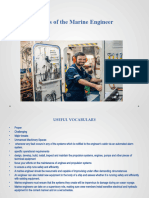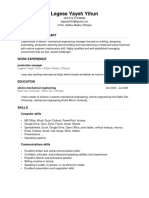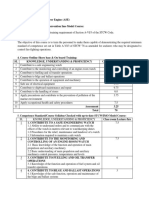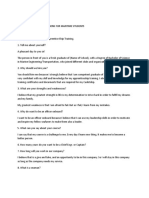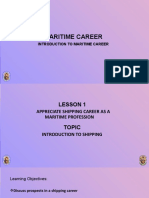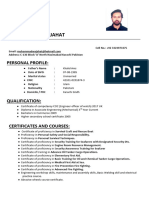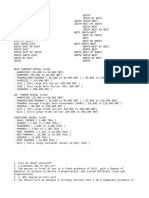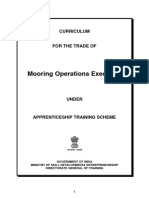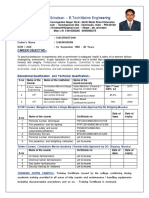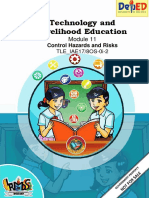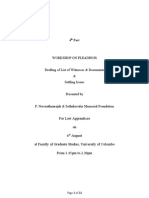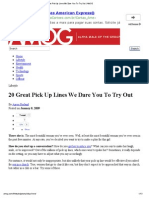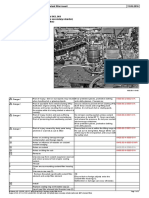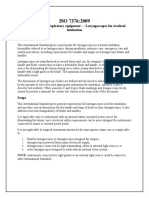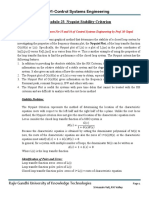HR BASED QUESTIONS AND ANSWER
1. Tell us about yourself.
2. Why did you choose marine engineering?
Ans: I chose marine engineering because I was fascinated with the
intricate systems that power and propel vessels across the seas. Since
childhood, I've been captivated by the vastness of the ocean and the
technology that enables humans to navigate it.
My decision was also influenced by a desire to merge my love for
engineering with a dynamic, ever-evolving industry. Marine engineering,
with its blend of mechanical, electrical, and naval architecture principles,
offers an exciting challenge that continually pushes the boundaries of
innovation.
Moreover, I'm drawn to the global nature of marine engineering, where
each project presents unique environmental and logistical considerations.
The prospect of working on diverse projects, from designing propulsion
systems for eco-friendly ships to ensuring safety standards on offshore
platforms, excites me.
Ultimately, choosing marine engineering aligns perfectly with my career
aspirations and allows me to contribute meaningfully to an industry that
plays a crucial role in global commerce and sustainability."
3. Tell us about your strength and weakness.
Ans: When discussing strengths and weaknesses in an interview, it's
essential to strike a balance between showcasing your capabilities and
demonstrating self-awareness and a willingness to improve. Here's a
sample response:
Strengths: One of my key strengths is my ability to adapt quickly to new
situations and challenges. Throughout my academic and professional
journey, I've encountered various scenarios that required me to think on
my feet and find effective solutions under pressure. This adaptability has
allowed me to thrive in dynamic environments and contribute positively to
team efforts.
Another strength of mine is my strong analytical skills. I have a knack for
breaking down complex problems into manageable components, allowing
me to identify root causes and develop strategic plans to address them.
Whether it's troubleshooting technical issues or optimizing processes, I
excel in analyzing data and making informed decisions.
1
�Furthermore, I consider communication as one of my strengths. I believe
in the power of clear and concise communication to foster collaboration
and drive results. Whether it's conveying technical information to non-
technical stakeholders or facilitating discussions within a team, I strive to
ensure that everyone is on the same page and working towards common
goals.
Weaknesses: One weakness I've identified is my tendency to get deeply
invested in projects, sometimes to the point of perfectionism. While this
drive for excellence can yield high-quality outcomes, it can also lead to
spending too much time on minor details and potentially missing
deadlines. I've been actively working on finding a balance between
striving for perfection and prioritizing efficiency to ensure timely delivery
without compromising quality.
Additionally, I've recognized that I can be overly self-reliant at times.
While I'm confident in my abilities to work independently and take
initiative, I understand the importance of collaboration and leveraging the
expertise of others. I've been actively seeking opportunities to delegate
tasks, seek input from colleagues, and embrace a more team-oriented
approach to problem-solving.
Overall, I view my weaknesses as areas for growth and development. I'm
committed to continuously learning and improving myself to become a
more well-rounded professional and valuable team member.
4. What do you know about DYNAGAS and why do you want to
work here?
Ans: Dynagas LNG Partners LP is a company primarily involved in the
shipping and transportation of liquefied natural gas (LNG). As of my last
update, Dynagas operates a fleet of LNG carriers, providing seaborne
transportation services to energy companies, LNG producers, and utilities
worldwide. The company's focus on LNG transportation positions it at the
forefront of the global energy transition, as LNG plays an increasingly vital
role in the transition to cleaner fuels.
Here's a response tailored to why you might want to work at Dynagas:
"I am particularly drawn to Dynagas Shipping Company due to its
prominent role in the LNG transportation sector. The company's
commitment to excellence, innovation, and sustainability aligns perfectly
with my professional values and aspirations.
Working at Dynagas would afford me the opportunity to contribute to the
critical task of facilitating the global energy transition. LNG transportation
plays a pivotal role in delivering clean and efficient energy to markets
2
� around the world, and I am eager to be a part of this transformative
journey.
Moreover, Dynagas's reputation for operational excellence and safety is
something that resonates with me deeply. I am impressed by the
company's track record of maintaining the highest standards of safety and
environmental stewardship in its operations. As someone who values
safety above all else, I am excited about the prospect of working in an
environment that prioritizes the well-being of its employees and the
communities it serves.
Furthermore, Dynagas's global presence and diverse fleet offer ample
opportunities for professional growth and development. I am eager to
leverage my skills and expertise to contribute meaningfully to the
company's success while also expanding my knowledge and experience in
the maritime industry.
In summary, I am genuinely enthusiastic about the possibility of joining
Dynagas Shipping Company and being a part of a dynamic team that is
driving positive change in the energy sector while upholding the highest
standards of excellence and integrity."
5. What are the main responsibility of a marine engineer on
board a vessel?
Ans: The main responsibilities of a marine engineer on board a vessel can
vary depending on the type of vessel and its specific systems, but
generally, they include:
1. Maintenance and Repair: Marine engineers are responsible for the
maintenance, repair, and operation of all machinery and systems on
board the vessel, including propulsion systems, engines, generators,
HVAC systems, and electrical systems. This involves regular inspections,
troubleshooting, and addressing any issues to ensure the safe and
efficient operation of the vessel.
2. Engine Room Operations: Marine engineers oversee the operation of
the engine room, which includes monitoring engine performance, fuel
consumption, temperature, and pressure levels. They ensure that all
machinery is operating within safe parameters and make adjustments as
necessary to optimize performance.
3. Safety and Environmental Compliance: Marine engineers play a
crucial role in ensuring compliance with safety regulations and
environmental standards. They conduct routine safety inspections,
implement safety procedures, and maintain emergency equipment to
respond effectively to any emergencies or environmental incidents.
3
�4. Watchkeeping: Marine engineers typically work in shifts and are
responsible for maintaining a continuous watch in the engine room. They
monitor equipment status, alarms, and other indicators to detect any
abnormalities and take appropriate action to prevent accidents or failures.
5. Training and Supervision: Marine engineers may be responsible for
training and supervising junior engineering officers and crew members.
They provide guidance on proper maintenance procedures, safety
protocols, and emergency response protocols to ensure that all personnel
are adequately prepared to carry out their duties effectively.
Overall, marine engineers play a critical role in ensuring the safe, efficient,
and environmentally responsible operation of vessels at sea. Their
expertise and dedication are essential for maintaining the integrity of the
vessel's machinery and systems and ensuring the safety of the crew and
cargo.
6. What safety protocols are most important to follow when
working on a ship?
Ans: Safety protocols are crucial for maintaining the well-being of crew
members and the integrity of the vessel. Here are some of the most
important safety protocols to follow when working on a ship:
1. Personal Protective Equipment (PPE): Always wear appropriate PPE,
including hard hats, safety glasses, gloves, steel-toed boots, and life
jackets, when working on deck or in the engine room.
2. Safe Working Practices: Adhere to safe working practices and
procedures outlined in the vessel's safety manual. This includes following
proper lifting techniques, securing tools and equipment when not in use,
and avoiding shortcuts that could compromise safety.
3. Fire Safety: Familiarize yourself with the location and proper use of
firefighting equipment, such as fire extinguishers, fire hoses, and
firefighting suits. Conduct regular fire drills and be prepared to respond
swiftly and effectively in the event of a fire emergency.
4. Emergency Response: Know the location of emergency exits, muster
stations, and life-saving appliances. Familiarize yourself with emergency
procedures, including how to deploy lifeboats and life rafts, use distress
signals, and communicate with the crew during emergencies.
5. Watchkeeping: Maintain a vigilant watch and be aware of potential
hazards and risks at all times. Report any safety concerns or hazards to
the appropriate personnel and take immediate action to mitigate risks and
prevent accidents.
4
�6. Safety Inspections and Maintenance: Conduct routine safety
inspections of equipment, machinery, and facilities to identify and address
any potential hazards or defects. Ensure that all safety equipment is
properly maintained and in good working condition.
7. Environmental Protection: Follow proper waste management and
pollution prevention procedures to minimize the environmental impact of
ship operations. Dispose of waste materials, including oil, garbage, and
sewage, in accordance with applicable regulations and guidelines.
8. Training and Education: Stay informed about safety regulations,
industry best practices, and emerging safety trends through ongoing
training and education. Participate in safety drills, seminars, and
workshops to enhance your knowledge and skills in safety management.
By following these safety protocols and remaining vigilant at all times, you
can help create a safe and secure working environment for yourself and
your fellow crew members aboard the ship.
7. How do you stay updated with the latest advancements in marine
engineering?
Ans: Staying updated with the latest advancements in marine engineering
is crucial for professional development and staying competitive in the
industry. Here are some effective ways to stay informed:
1. Industry Publications and Journals: Subscribe to marine engineering
publications and journals, such as Marine Technology Society Journal,
Marine Engineers Review, or Marine Technology Reporter. These
publications often feature articles, research papers, and case studies on
the latest technologies, trends, and best practices in marine engineering.
2. Professional Associations and Organizations: Join professional
associations and organizations related to marine engineering, such as the
Society of Naval Architects and Marine Engineers (SNAME) or the Institute
of Marine Engineering, Science & Technology (IMarEST). These
organizations often host conferences, seminars, and workshops where you
can learn about the latest advancements and network with industry
professionals.
3. Continuing Education and Training Programs: Enroll in continuing
education and training programs to enhance your knowledge and skills in
specific areas of marine engineering. Many universities, colleges, and
training institutes offer courses, certificates, and degree programs in
marine engineering, naval architecture, and related fields.
4. Industry Conferences and Exhibitions: Attend industry conferences,
exhibitions, and trade shows, such as OTC (Offshore Technology
Conference) or SMM (Shipbuilding, Machinery & Marine Technology).
These events provide opportunities to learn about new technologies,
products, and services from leading companies and experts in the field.
5
�5. Online Resources and Webinars: Take advantage of online resources,
webinars, and educational platforms to access a wealth of information on
marine engineering topics. Websites like Marine Insight, The Naval
Architect, and Marine Engineering Online offer articles, videos, and
webinars on various aspects of marine engineering.
6. Networking: Build a strong professional network within the marine
engineering community by attending industry events, joining online
forums and discussion groups, and connecting with peers and mentors.
Networking allows you to exchange ideas, share experiences, and stay
updated on industry trends and developments.
7. Research and Innovation: Stay curious and proactive in seeking out
new research and innovation in marine engineering. Follow academic
institutions, research organizations, and technology companies that are
pushing the boundaries of marine technology and participate in
collaborative research projects or partnerships when possible.
By actively engaging in these activities and remaining open to learning
and exploration, you can stay updated with the latest advancements in
marine engineering and position yourself for success in your career.
8. How would you manage stress especially during long
voyages?
Ans: Managing stress during long voyages is essential for maintaining
mental and physical well-being and ensuring optimal performance on
board. Here are some strategies for effectively managing stress:
1. Maintain a Healthy Lifestyle: Prioritize healthy habits such as regular
exercise, balanced nutrition, and sufficient sleep. Physical activity can
help reduce stress levels and improve mood, while proper nutrition and
sleep are essential for overall health and resilience.
2. Practice Relaxation Techniques: Incorporate relaxation techniques
such as deep breathing, meditation, or progressive muscle relaxation into
your daily routine. These techniques can help calm the mind, reduce
tension, and promote a sense of relaxation and well-being.
3. Stay Connected: Maintain regular communication with loved ones
ashore through phone calls, emails, or video chats. Social support can
provide emotional comfort and help alleviate feelings of isolation or
loneliness during long voyages.
4. Engage in Hobbies and Leisure Activities: Find activities that you
enjoy and make time for them during your downtime on board. Whether
it's reading, listening to music, watching movies, or pursuing hobbies like
painting or writing, engaging in enjoyable activities can help distract from
stressors and promote relaxation.
5. Set Realistic Goals and Prioritize Tasks: Break down tasks into
manageable steps and prioritize them based on importance and urgency.
Setting realistic goals and focusing on one task at a time can help prevent
feelings of overwhelm and improve productivity.
6
�6. Establish a Routine: Establishing a daily routine can provide structure
and stability during long voyages. Schedule regular meal times, exercise
sessions, rest breaks, and leisure activities to maintain a sense of
normalcy and routine.
7. Seek Support and Guidance: If you're experiencing significant stress or
struggling to cope, don't hesitate to seek support from colleagues,
supervisors, or onboard support services. Talking to someone you trust
can provide perspective, validation, and practical advice for managing
stress effectively.
8. Mindfulness and Awareness: Practice mindfulness and cultivate
awareness of your thoughts, feelings, and physical sensations.
Mindfulness techniques can help you stay present in the moment, reduce
rumination on past or future stressors, and enhance your ability to cope
with challenges as they arise.
By implementing these strategies and developing resilience-building skills,
you can effectively manage stress during long voyages and maintain your
well-being and performance on board.
9, Give an example of a time when you had to work as part of a
team. What was your role and how did you contribute?
Ans: "In my previous role, I was part of a team tasked with implementing
a new software system to streamline our company's inventory
management process. As a member of the team, my role was primarily
focused on gathering requirements from various departments, configuring
the software to meet those requirements, and providing user training and
support during the implementation phase.
One specific instance where teamwork was crucial was during the data
migration phase of the project. We needed to transfer a large volume of
inventory data from the old system to the new one while ensuring
accuracy and completeness. My role involved collaborating closely with
our IT team and departmental stakeholders to develop a data migration
plan, define data mapping rules, and oversee the execution of the
migration process.
To contribute effectively to the team, I took on the responsibility of
coordinating communication between different stakeholders, ensuring
that everyone was aligned on the project timeline, milestones, and
deliverables. I also leveraged my technical expertise to troubleshoot any
issues that arose during the data migration and work collaboratively with
the IT team to implement solutions in a timely manner.
Additionally, I proactively identified opportunities for process
improvement and suggested enhancements to the software configuration
based on feedback from end-users. By actively participating in team
meetings, sharing insights, and offering support to my colleagues, I
7
�helped foster a collaborative environment where everyone felt
empowered to contribute their ideas and expertise.
Ultimately, through our collective efforts and effective teamwork, we
successfully implemented the new software system on schedule and
within budget, resulting in significant improvements in inventory
accuracy, efficiency, and cost savings for the company."



